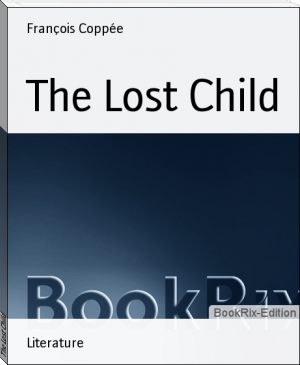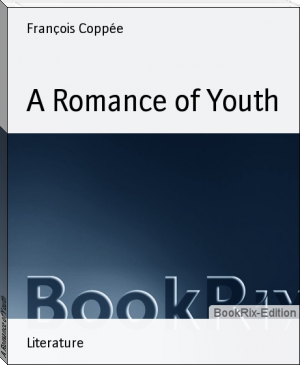International Short Stories: French - - (new books to read .TXT) 📗

- Author: -
- Performer: -
Book online «International Short Stories: French - - (new books to read .TXT) 📗». Author -
She talked on that particular day for a few minutes with the women who were washing. The sound of her pearly laughter reached as far as me, mingled with the loud voice of the Durance. Then she stooped down to take a little water in the hollow of her hand; but the bank was high, and Babet, who was on the point of slipping, saved herself by clutching the grass. I gave a frightful shudder, which made my blood run cold. I rose hastily, and, without feeling ashamed, without reddening, ran to the young girl. She cast a startled look at me; then she began to smile. I bent down, at the risk of falling. I succeeded in filling my right hand with water by keeping my fingers close together. And I presented this new sort of cup to Babet’ asking her to drink.
The women who were washing laughed. Babet, confused, did not dare accept; she hesitated, and half turned her head away. At last she made up her mind, and delicately pressed her lips to the tips of my fingers; but she had waited too long, all the water had run away. Then she burst out laughing, she became a child again, and I saw very well that she was making fun of me.
I was very silly. I bent forward again. This time I took the water in both hands and hastened to put them to Babet’s lips. She drank, and I felt the warm kiss from her mouth run up my arms to my breast, which it filled with heat.
“Oh! how my uncle must sleep!” I murmured to myself.
Just as I said that, I perceived a dark shadow beside me, and, having turned round, I saw my uncle Lazare, in person, a few paces away, watching Babet and me as if offended. His cassock appeared quite white in the sun; in his look I saw reproaches which made me feel inclined to cry.
Babet was very much afraid. She turned quite red, and hurried off stammering:
“Thanks, Monsieur Jean, I thank you very much.”
As for me, wiping my wet hands, I stood motionless and confused before my uncle Lazare.
The worthy man, with folded arms, and bringing back a corner of his cassock, watched Babet, who was running up the pathway without turning her head. Then, when she had disappeared behind the hedges, he lowered his eyes to me, and I saw his pleasant countenance smile sadly.
“Jean,” he said to me, “come into the broad walk. Breakfast is not ready. We have half an hour to spare.”
He set out with his rather heavy tread, avoiding the tufts of grass wet with dew. A part of the bottom of his cassock that was dragging along the ground, made a dull crackling sound. He held his breviary under his arm; but he had forgotten his morning lecture, and he advanced dreamily, with bowed head, and without uttering a word.
His silence tormented me. He was generally so talkative. My anxiety increased at each step. He had certainly seen me giving Babet water to drink. What a sight, O Lord! The young girl, laughing and blushing, kissed the tips of my fingers, whilst I, standing on tip-toe, stretching out my arms, was leaning forward as if to kiss her. My action now seemed to me frightfully audacious. And all my timidity returned. I inquired of myself how I could have dared to have my fingers kissed so sweetly.
And my uncle Lazare, who said nothing, who continued walking with short steps in front of me, without giving a single glance at the old trees he loved! He was assuredly preparing a sermon. He was only taking me into the broad walk to scold me at his ease. It would occupy at least an hour: breakfast would get cold, and I would be unable to return to the water’s edge and dream of the warm burns that Babet’s lips had left on my hands.
We were in the broad walk. This walk, which was wide and short, ran beside the river; it was shaded by enormous oak trees, with trunks lacerated by seams, stretching out their great, tall branches. The fine grass spread like a carpet beneath the trees, and the sun, riddling the foliage, embroidered this carpet with a rosaceous pattern in gold. In the distance, all around, extended raw green meadows.
My uncle went to the bottom of the walk, without altering his step and without turning round. Once there, he stopped, and I kept beside him, understanding that the terrible moment had arrived.
The river made a sharp curve; a low parapet at the end of the walk formed a sort of terrace. This vault of shade opened on a valley of light. The country expanded wide before us, for several leagues. The sun was rising in the heavens, where the silvery rays of morning had become transformed into a stream of gold; blinding floods of light ran from the horizon, along the hills, and spread out into the plain with the glare of fire.
After a moment’s silence, my uncle Lazare turned towards me.
“Good heavens, the sermon!” I thought, and I bowed my head. My uncle pointed out the valley to me, with an expansive gesture; then, drawing himself up, he said, slowly:
“Look, Jean, there is the spring. The earth is full of joy, my boy, and I have brought you here, opposite this plain of light, to show you the first smiles of the young season. Observe what brilliancy and sweetness! Warm perfumes rise from the country and pass across our faces like puffs of life.”
He was silent and seemed dreaming. I had raised my head, astonished, breathing at ease. My uncle was not preaching.
“It is a beautiful morning,” he continued, “a morning of youth. Your eighteen summers find full enjoyment amidst this verdure which is at most eighteen days old. All is great brightness and perfume, is it not? The broad valley seems to you a delightful place: the river is there to give you its freshness, the trees to lend you their shade, the whole country to speak to you of tenderness, the heavens themselves to kiss those horizons that you are searching with hope and desire. The spring belongs to fellows of your age. It is it that teaches the boys how to give young girls to drink—”
I hung my head again. My uncle Lazare had certainly seen me.
“An old fellow like me,” he continued, “unfortunately knows what trust to place in the charms of spring. I, my poor Jean, I love the Durance because it waters these meadows and gives life to all the valley; I love this young foliage because it proclaims to me the coming of the fruits of summer and autumn; I love this sky because it is good to us, because its warmth hastens the fecundity of the earth. I should have had to tell you this one day or other; I prefer telling it you now, at this early hour. It is spring itself that is giving you the lesson. The earth is a vast workshop wherein there is never a slack season. Observe this flower at our feet; to you it is perfume; to me it is labour, it accomplishes its task by producing its share of life, a little black seed which will work in its turn, next spring. And, now, search the vast horizon. All this joy is but the act of generation. If the country be smiling, it is because it is beginning the everlasting task again. Do you hear it now, breathing hard, full of activity and haste? The leaves sigh, the flowers are in a hurry, the corn grows without pausing; all the plants, all the herbs are quarrelling as to which shall spring up the quickest; and the running water, the river comes to assist in the common labour, and the young sun which rises in the heavens is entrusted with the duty of enlivening the everlasting task of the labourers.”
At this point my uncle made me look him straight in the face. He concluded in these terms:
“Jean, you hear what your friend the spring says to you. He is youth, but he is preparing ripe age; his bright smile is but the gaiety of labour. Summer will be powerful, autumn bountiful, for the spring is singing at this moment, while courageously performing its work.”
I looked very stupid. I understood my uncle Lazare. He was positively preaching me a sermon, in which he told me I was an idle fellow and that the time had come to work.
My uncle appeared as much embarrassed as myself. After having hesitated for some instants he said, slightly stammering:
“Jean, you were wrong not to have come and told me all—as you love Babet and Babet loves you—”
“Babet loves me!” I exclaimed.
My uncle made me an ill-humoured gesture.
“Eh! allow me to speak. I don’t want another avowal. She owned it to me herself.”
“She owned that to you, she owned that to you!”
And I suddenly threw my arms round my uncle Lazare’s neck.
“Oh! how nice that is!” I added. “I had never spoken to her, truly. She told you that at the confessional, didn’t she? I would never have dared ask her if she loved me, and I would never have known anything. Oh! how I thank you!”
My uncle Lazare was quite red. He felt that he had just committed a blunder. He had imagined that this was not my first meeting with the young girl, and here he gave me a certainty, when as yet I only dared dream of a hope. He held his tongue now; it was I who spoke with volubility.
“I understand all,” I continued. “You are right, I must work to win Babet. But you will see how courageous I shall be. Ah! how good you are, my uncle Lazare, and how well you speak! I understand what the spring says: I, also, will have a powerful summer and an autumn of abundance. One is well placed here, one sees all the valley; I am young like it, I feel youth within me demanding to accomplish its task—”
My uncle calmed me.
“Very good, Jean,” he said to me. “I had long hoped to make a priest of you, and I imparted to you my knowledge with that sole aim. But what I saw this morning at the waterside compels me to definitely give up my fondest hope. It is Heaven that disposes of us. You will love the Almighty in another way. You cannot now remain in this village, and I only wish you to return when ripened by age and work. I have chosen the trade of printer for you; your education will serve you. One of my friends, who is a printer at Grenoble, is expecting you next Monday.”
I felt anxious.
“And I shall come back and marry Babet?” I inquired.
My uncle smiled imperceptibly; and, without answering in a direct manner, said:
“The remainder is the will of Heaven.”
“You are heaven, and I have faith in your kindness. Oh! uncle, see that Babet does not forget me. I will work for her.”
Then my uncle Lazare again pointed out to me the valley which the warm golden light was overspreading more and more.
“There is hope,” he said to me. “Do not be as old as I am, Jean. Forget my sermon, be as ignorant as this land. It does not trouble about the autumn; it is all engrossed with the joy of its smile; it labours, courageously and without a care. It hopes.”
And we returned to the parsonage, strolling along slowly in the grass, which was scorched by the sun, and chatting with concern of our approaching separation.
Breakfast was cold, as I had foreseen; but that did not trouble me much. I had tears in my eyes each time I looked at my uncle Lazare. And, at the thought of Babet, my heart beat fit to choke me.
I do not remember what I did during the remainder of





Comments (0)